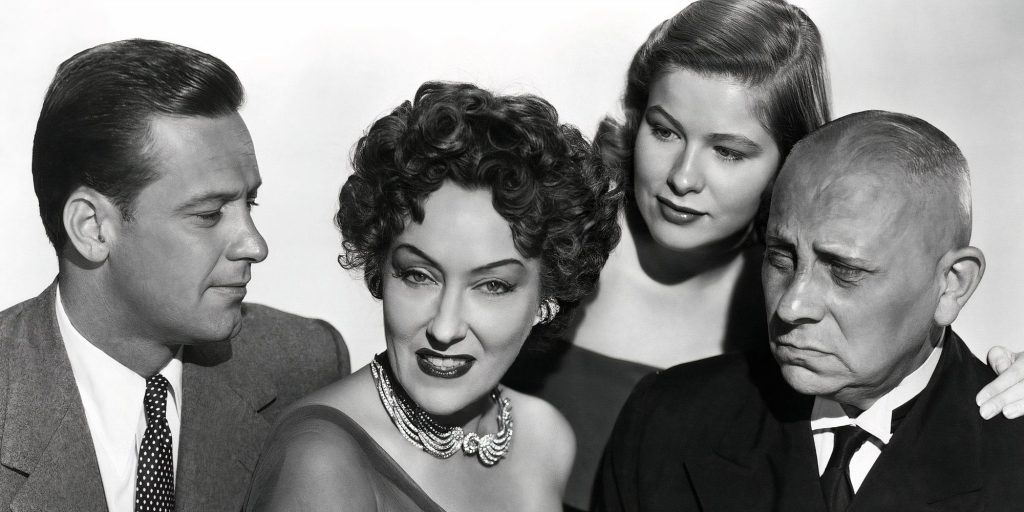“Hooray for Hollywood,” the old song says. Since the inception of movies, Hollywood has had an interesting habit of making movies about itself. Until the 1950s, those movies almost exclusively celebrated moviemaking as a kind of idyllic profession, all fun and joy for those lucky enough to work in it. That changed in 1950 when director Billy Wilder issued a blistering denouncement of Hollywood with his film Sunset Boulevard.
Today, Sunset Boulevard lands on just about every list of the Greatest Movies Ever, usually somewhere in the top ten. That says something. More than 70 years and one Broadway musical adaptation later, Sunset Boulevard feels as probing and scathing as ever. Told with unforgettable dialog, strange meta-commentary on those who made the film, and acted with some of the greatest performances to ever hit the screen, it deserves its spot as one of the 10 Best Movies Ever.
Sunset Boulevard Carpet Bombs the Movies
Few Movies See Themselves With Such Clarity
By the middle of the 20th century, movies had become an everyday part of American life. Yet, ell-established or aging stars often vanished without a trace, replaced by “fresh faces” of young, up-and-coming talent. Given that distraction, few ever questioned what happened to some of their favorite stars. That was especially true when it came to stars of the silent screen. When “talkies” came into vogue, a whole generation of screen legends evaporated. Sunset Boulevard begins under this pretext. Wannabe screenwriter Joe Gillis (William Holden) has hit rock bottom. Unable to find a job or pay his bills, he goes to Paramount Studios for one last pitch meeting. Though his story doesn’t sell, he does attract the attention of Betty Schafer (Nancy Olson), a beautiful young secretary. Betty encourages Joe to hone his talent; she wants to become a screenwriter herself.
On his way home from the meeting, Joe encounters a pair of repo men who have come to reclaim his car. A high-speed chase ensues, as Joe hides out in a driveway of an old Hollywood mansion. There, he encounters Norma Desmond, (Gloria Swanson) a 50-something former silent film megastar who has retreated to her home after her career opportunities dried up. Norma strikes Joe as totally strange; she mistakes him for an undertaker come to bury her pet chimpanzee. Their meeting leads to one of the best exchanges in the movies:
Joe: You used to be in pictures. You used to be big.
Norma: I am big. It’s the pictures that got small.
Joe: I knew there was something wrong with them.
There are multiple layers to that brief bit of dialogue. Norma, in her ego and delusion, condemns the entire industry for forsaking her. She’s not the problem; the whole system is the problem.
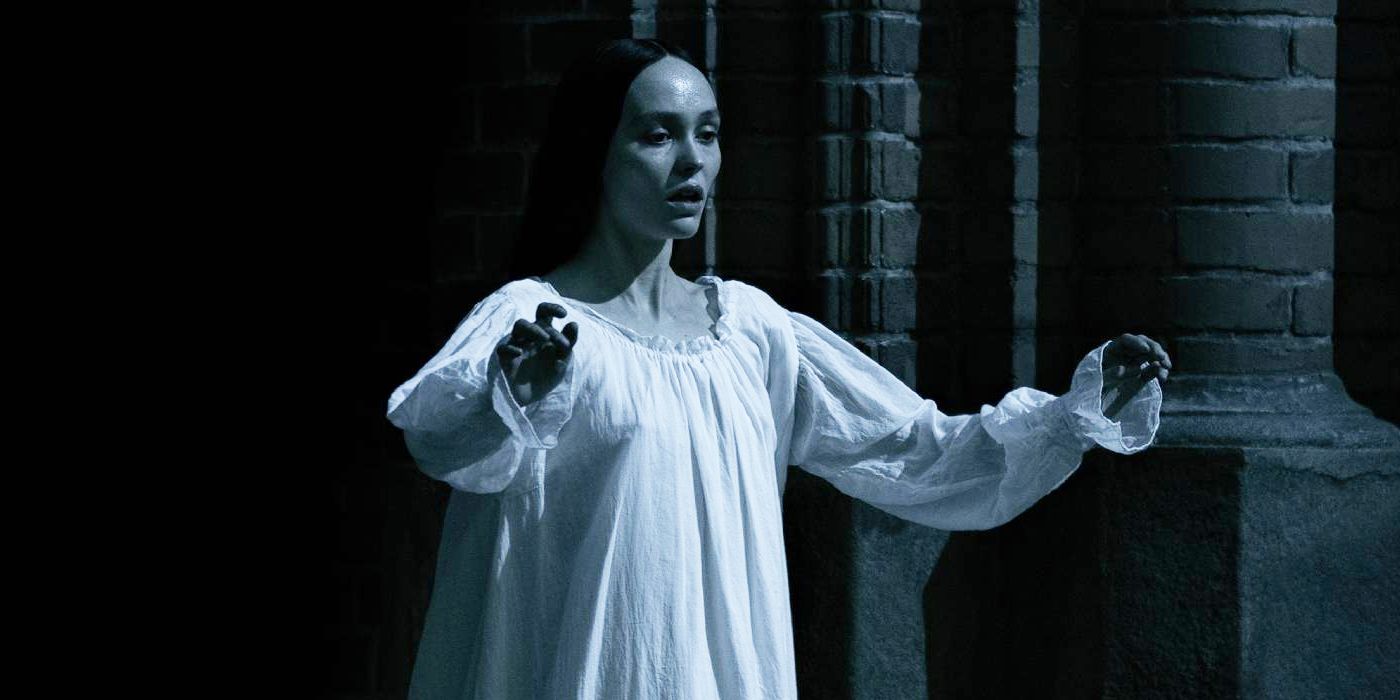
Related
Every Change Robert Eggers’ Nosferatu Makes to the 1922 Silent Movie
Robert Eggers’ Nosferatu makes a series of changes to its adaptation of the original 1922 silent film in order to add nuance and more intrigue.
Just about every film fan, whether he’s seen Sunset Boulevard or not, can quote that line. But most of them forget Joe’s follow-up zinger. Not only does his retort characterize his growing cynicism; he knew how Norma would react. In just two lines, director Wilder, working from a script he co-wrote with Charles Brackett and D.M. Marshman Jr., shows how much Hollywood knows itself. Like Joe, the three screenwriters have encountered Norma’s level of vanity before. It also speaks volumes that Norma doesn’t even notice Joe’s barb, instead launching into a rant about her overlooked talent.
The Plot of Sunset Boulevard Will Leave Viewers In Shock
Few Movies Have This Level of Mystique
Norma mentions to Joe that she has begun work on a new script that will see her play 16-year-old Salome, the Biblical character who demands the head of John the Baptist. Joe can barely contain his giggles, but he concocts a scheme of his own. He offers to help Norma write the script in exchange for a healthy paycheck. Norma agrees, and her butler Max (Erich von Stroheim) shows Joe to a guest room. Max puts Joe off a bit, as it appears he’d planned to have Joe stay the night as soon as he appeared.
Joe and Norma begin work on the script, making little progress. Norma demands as much screen time as possible, with the story taking a backseat to her role. She also tells Joe that she plans to send the script to Cecil B. DeMille since the two of them worked together when she was young. Without asking, Max has all of Joe’s belongings moved to Norma’s mansion. The repo men also arrive and confiscate Joe’s car.
Joe begins to spend every waking moment with Norma, and she showers him with gifts: fancy new clothes, a solid gold cigarette case, and more. She also hasn’t paid him any cash, keeping him on a very tight leash. At a late-night trip to Schwab’s Drugstore (a former Hollywood landmark where would-be stars — and a few established names — all hung out), Joe encounters his best friend Artie (Jack Webb, of Dragnet fame), who introduces him to his new fiance: Betty. Joe and Betty bond again, and Joe encourages her to work on a script of her own.
The weeks turn to months, and when New Year’s Eve arrives, Norma throws a lavish party, complete with caterers and a live orchestra. Joe realizes that she’s throwing the party for just the two of them; even Max must stand by and watch. Norma confesses her love to Joe, who flees to Artie and Betty’s apartment. Betty and Joe decide to work on a script together, and Joe decides to leave Norma and her script behind. When he calls to tell Max, the butler informs him that Norma has attempted suicide. Joe rushes back, and he and Norma make love.
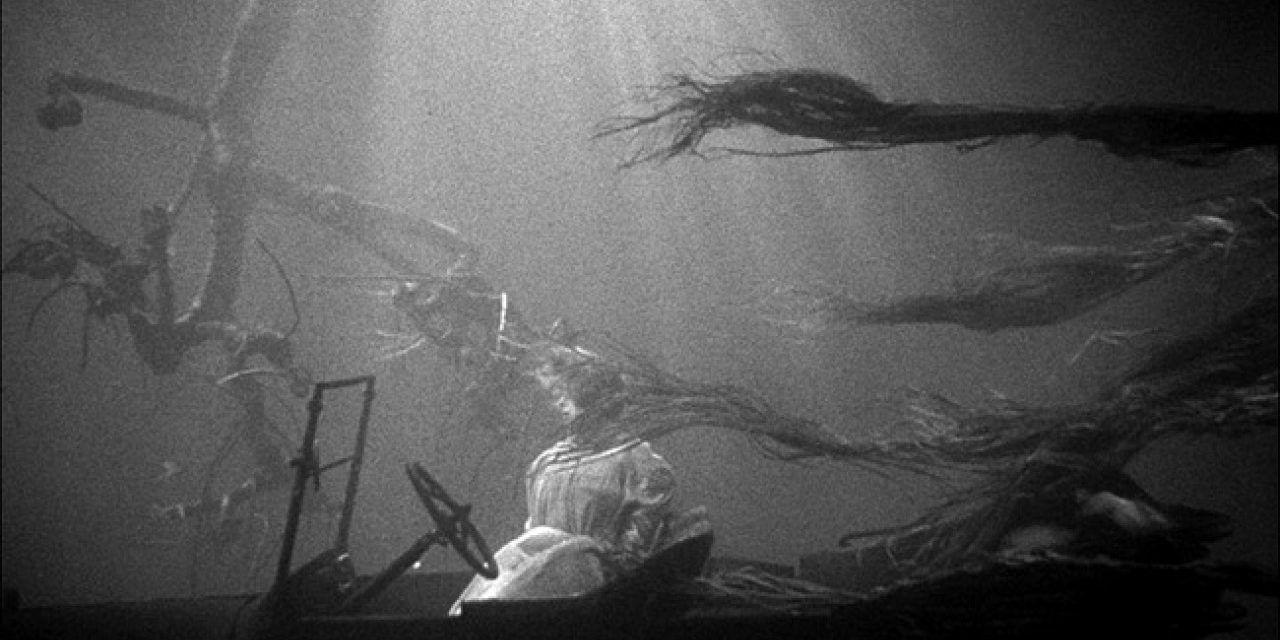
Related
This 69-Year-Old Film Noir Thriller With 93% on Rotten Tomatoes Was a Critical Failure Upon Release
Thrillers can come in all shapes and sizes, but few measure up to an iconic classic that flopped when it first came out.
Sunset Boulevard Plays With Audience Expectations
Viewers Cannot Decide How to Feel About the Characters
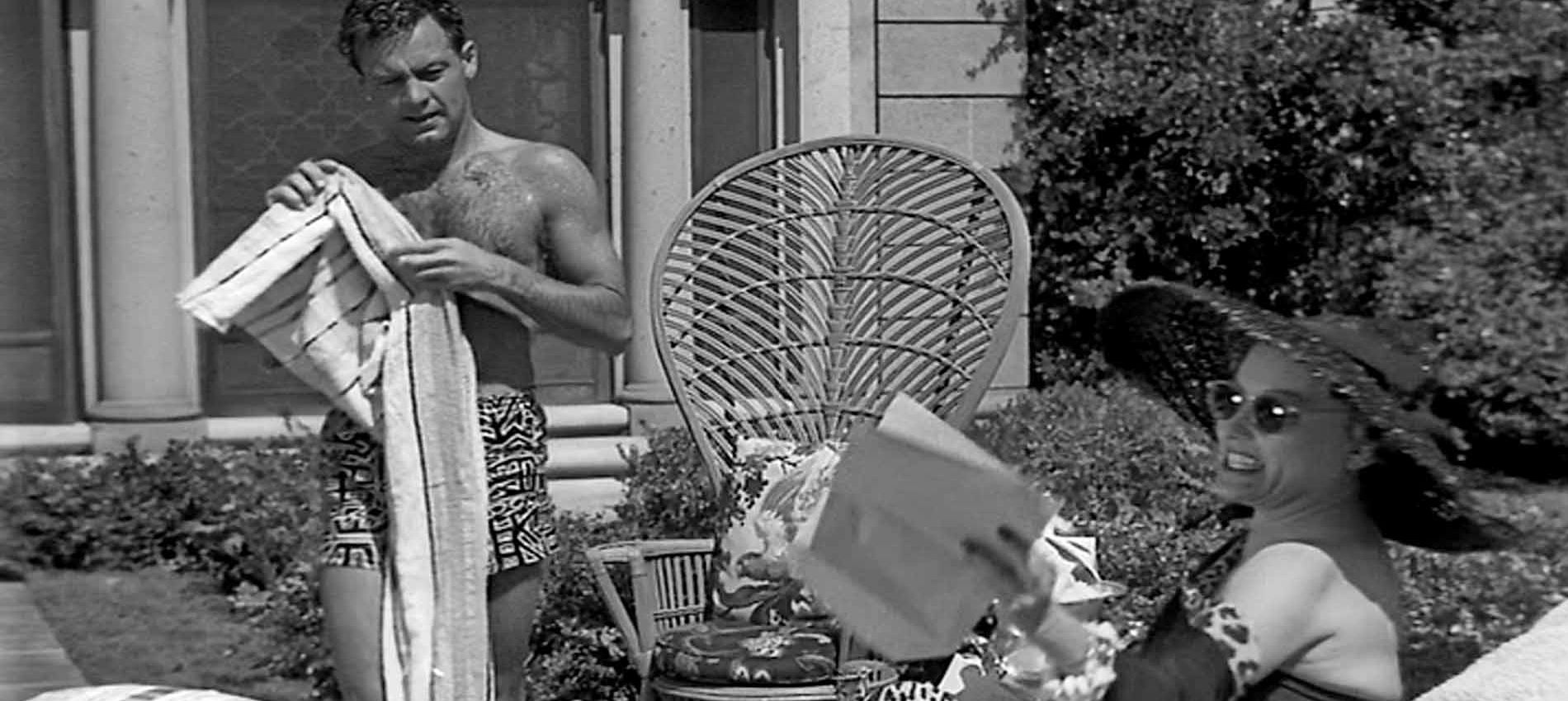
Weeks pass, and Norma receives a call from Paramount. Certain that DeMille wants to make her script, she, Joe and Max all drive to visit DeMille. When they arrive at Paramount, DeMille (who plays himself) reacts with horror. He and Norma enjoy a warm reunion, and the other actors, technicians and studio hands all rush to greet Norma, whom they all remember as a great star. Meanwhile, Joe and Max learn that the call from Paramount came from an executive who wanted to borrow Norma’s car for a movie. They both decide they can’t tell Norma.
As Norma continues to prep for her big return to the screen, Joe and Betty spend their nights working on their script. Joe takes care not to tell Betty about his relationship with Norma. The pair form a natural bond, talking about their ambitions and about the movies. Then, one night, they kiss and confess their love for one another. Betty wants to leave Artie for Joe; Joe feels even more ashamed. Not only has he taken the life of, in essence, a sex worker, he’s also stealing his best friend’s fiance. Joe returns to Norma’s mansion as Max waits for him. Max informs Joe that Norma has become suspicious of his nighttime meetings. He also reveals that he was once a great director, who too fell in love with Norma. When she left him, he begged to stay close to her, taking on the role as her submissive butler.
Norma rifles through Joe’s things and finds Betty’s phone number. She phones her to reveal her relationship with Joe, but Joe intervenes. He invites Betty to the mansion. When she arrives, he confesses his gigolo lifestyle, and ends their relationship. Betty leaves in tears. After she’s gone, Norma throws herself at Joe, thinking their love will last. Instead, Joe prepares to leave, returning all of Norma’s gifts to her. Joe also tells Norma the truth about the script, DeMillie, and her car. As Joe tries to leave, Norma shoots him. He falls into her swimming pool and dies.
The next morning, photographers and journalists, along with police, flock to the scene. Norma has lost all touch with reality, believing herself the greatest star of all. To spare her further humiliation, Max tells her that DeMille has come to shoot her big scene in her script. The police play along to arrest her quietly, and Norma delivers a heartfelt speech about devoting her life to the movies. In a final twist of fate, Norma gets her big close-up as the screen fades to black.
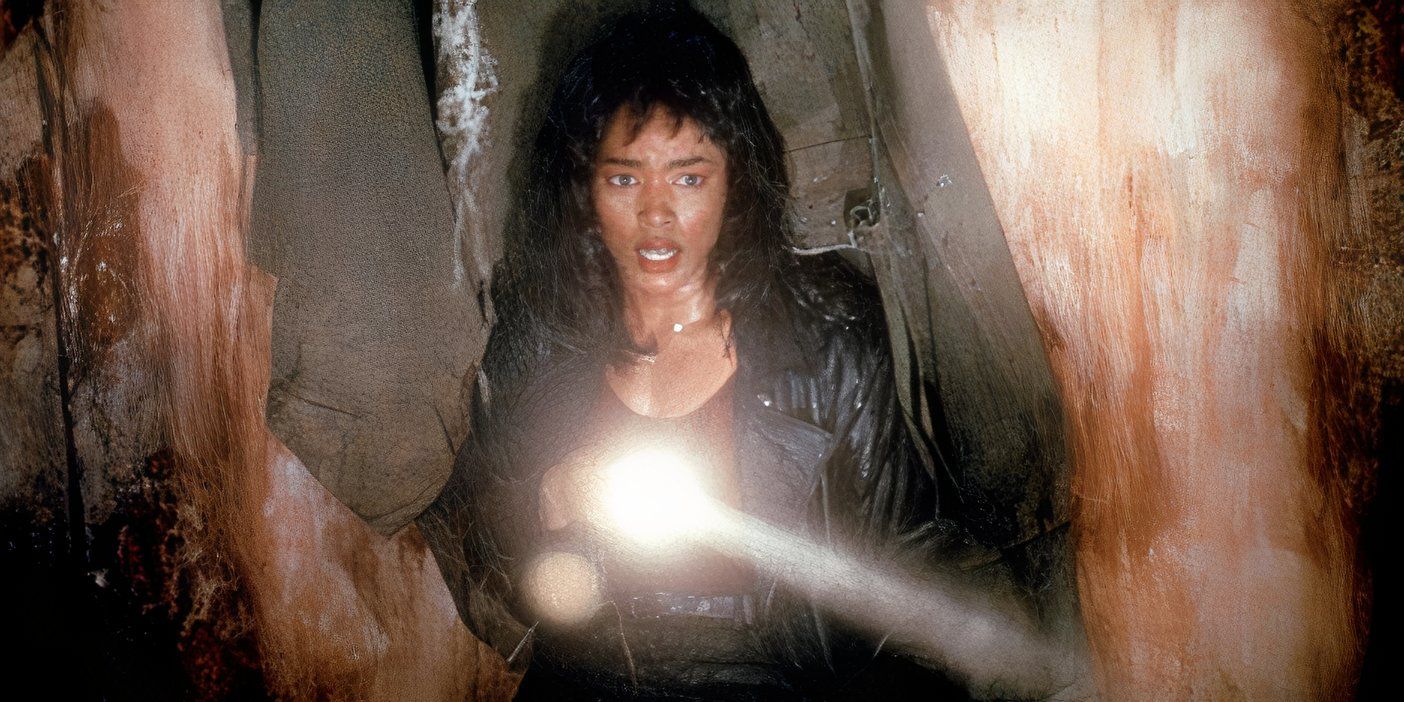
Related
Wes Craven’s Underrated 30-Year-Old Vampire Movie Hits Paramount+
An underrated Wes Craven classic has found itself a new streaming home alongside a whole host of other iconic horror feature films.
Sunset Boulevard Features One of the Greatest Performances Ever
Gloria Swanson Doesn’t Hold Back
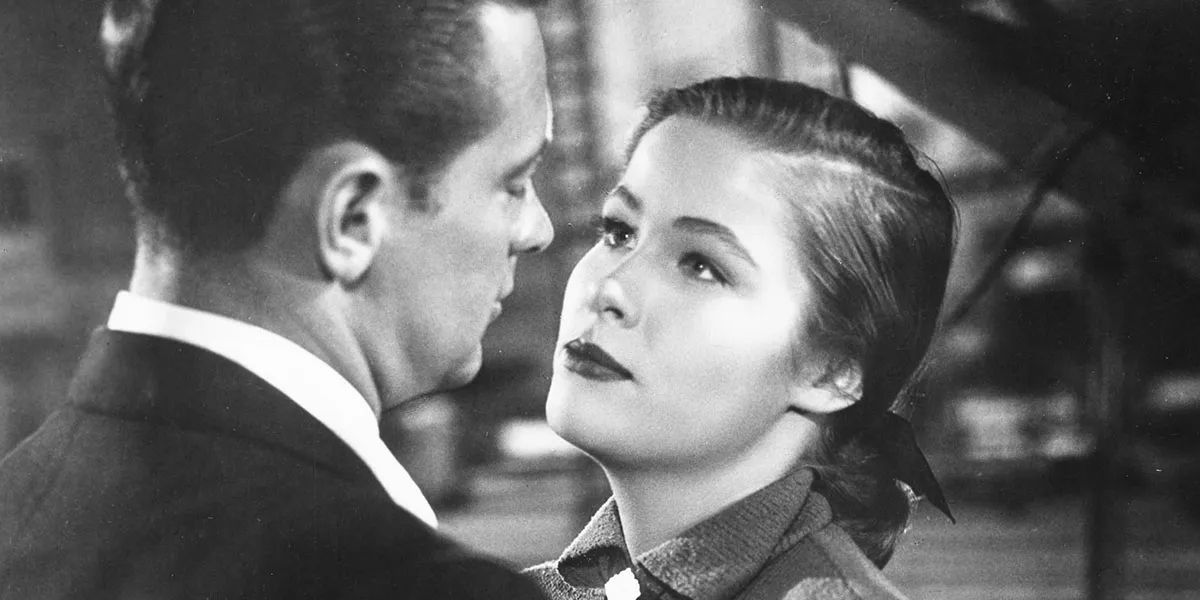
Sunset Boulevard force-fed Hollywood some strong medicine. Despite its dark subject matter, it became a hit and scored 11 Oscar nominations. Though it won for Screenplay, Franz Waxman’s score and Best Art Direction, the movie also became one of the few to score nominations in every acting category. The Best Actress race saw Gloria Swanson square off against Bette Davis, whose performance in All About Eve often ranks as the best of her career. In the end, both actresses lost to Judy Holliday; Oscar historians often name the Swanson/Davis loss as one of the biggest slights in Academy Awards history.
The reason? Quite simply, Gloria Swanson gives one of the greatest performances of all time, and one of the bravest. One of the biggest stars of silent movies, she’d only made sporadic appearances since the coming of sound. To reintroduce herself to audiences as an aging, half-mad murderess took a complete lack of vanity; Swanson didn’t care that the role would color her legacy. For that matter, she also didn’t care that, at times, the line between her own life and the character of Norma seemed to evaporate. Like Norma, Swanson had enjoyed major stardom, only to fall by the wayside during the talkie era. Furthermore, her acting choices in the role — playing Norma with exaggerated silent movie-type gestures and expressions — border on self-parody. In one of the movie’s most meta moments, Norma and Joe watch one of Norma’s earlier films. Wilder extracted the excerpts from Queen Kelly, a weepy melodrama that starred Swanson, and that was also directed by von Stroheim, who plays Max.
Indeed, von Stroheim also skates on the edge of self-parody throughout Sunset Boulevard. Once a great director in his own right, von Stroheim had his career derailed after the disaster of Queen Kelly. Swanson had him fired due to an out-of-control budget. The movie went unfinished, and von Stroheim was also fired from his follow-up, Hello Sister!, which removed his credit and underwent heavy reshoots. He never worked as a director again. In the moments when Max discusses sacrificing his career for Norma, von Stroheim doesn’t hesitate to lean into the pathetic nature of his character.
Sunset Boulevard and Blatant Sexual Kink
It’s Hard To Believe They Got Away With This in 1950
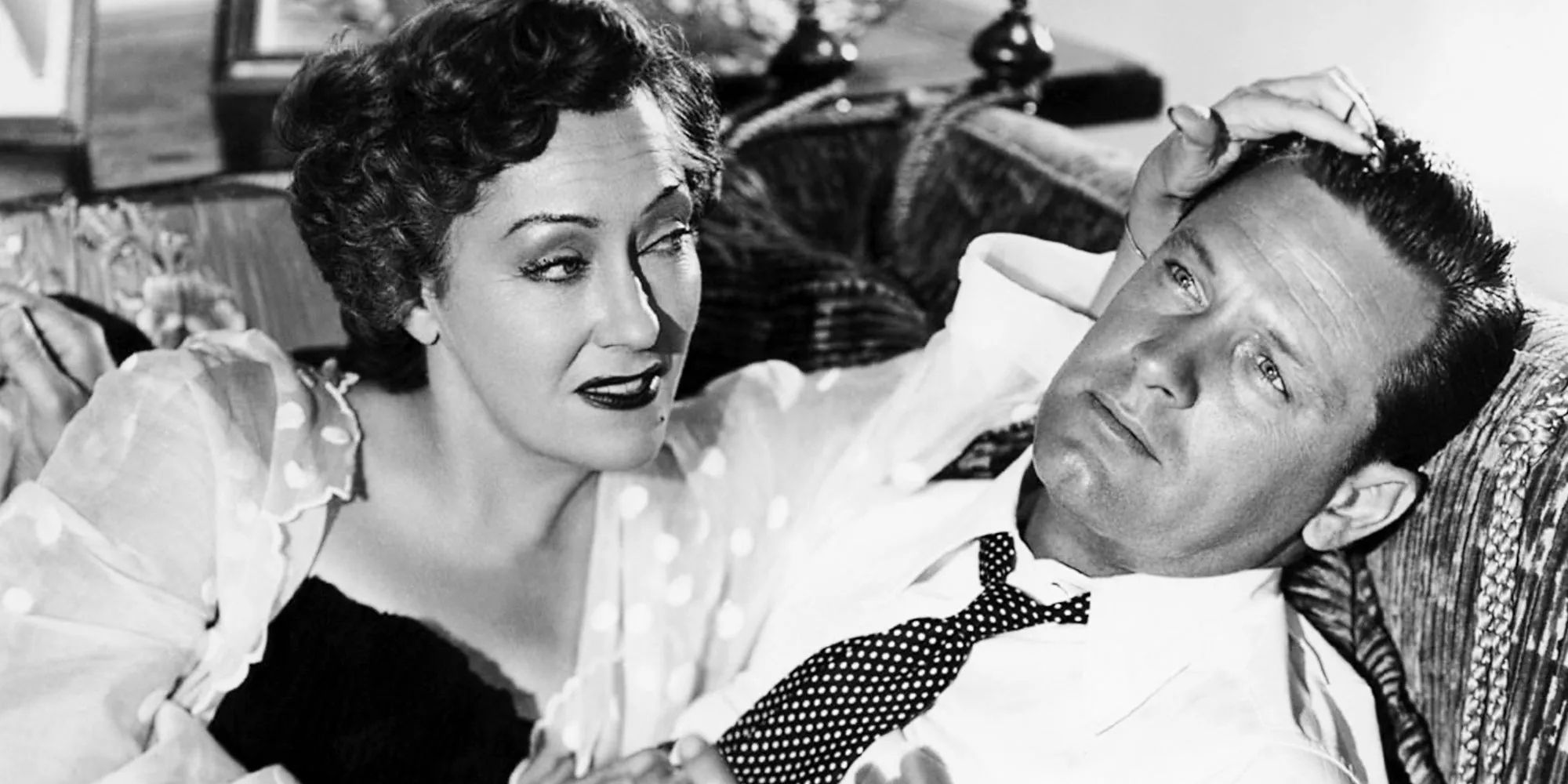
Nor does von Stroheim blush at some of the sexual innuendo Wilder saddles him with. Sunset Boulevard has a kinky quality to it. Norma and Max have a literal servant-master quality to their relationship; Max suffers her insults and emasculation because it only makes him more attracted to her. Norma and Joe have a similar dynamic, though Joe rails against it. Norma seems to love that about him, evermore aroused when she wins control over him. Few movies, even today, have such blatant sexual subtext. That Wilder and company got away with it in 1950 boggles the mind.
The kinkiness only adds to the Hollywood weirdness Wilder wants to channel throughout the film. Audiences seeing Sunset Boulevard will have a hard time deciding if they should laugh or gag at the movie. Watching, for example, as Norma throws a funeral for a monkey feels like something out of a screwball comedy. But Wilder and Swanson don’t play the scene with sarcasm; they play it with total sincerity. It makes the audience sympathize with Norma, even while finding her weird. The same goes for the Max-Norma relationship. It seems like a punchline to a joke, but one the audience can’t really laugh at.
Swanson might give the key performance in Sunset Boulevard, but that should diminish the contribution of Nancy Olson or William Holden. As Betty, Olson finds the right mix of naivete, pluck and bloodthirsty ambition to make Betty compelling and unpredictable. William Holden became a major star off of Sunset’s success, giving one of the best performances of his career. By turns, he reveals Joe as cynical, calculating, funny, pathetic and sad. No doubt his struggles as a writer grew out of those Wilder, Brackett, and Marshman lived through themselves. Joe’s desperation has such authenticity to it that the audience can forgive his sarcasm and manipulation. Without it, the character — and the movie — couldn’t work.
Wilder also imbues Sunset Boulevard with a sense of cruel irony. Anyone could make a case that all four main characters are dreadful people. At the same time, Wilder and his actors all make these characters sympathetic: the world has cast Norma aside; Joe can’t find work, Norma tortures Max, and Betty wants to remain loyal to Artie, but can’t control her feelings. And, in the end, Wilder grants each of these characters their wish, albeit in a cruel way. Betty gets her great, tragic love story. Joe, who always wanted a house with a swimming pool gets one — literally. Max returns to directing as he guides Norma into the hands of the police. Norma gets her celebrity comeback in front of the cameras, though not in a way anyone would have anticipated.
Sunset Boulevard Is a Frank Look at Hollywood
The Thin Line Between Love and Hate
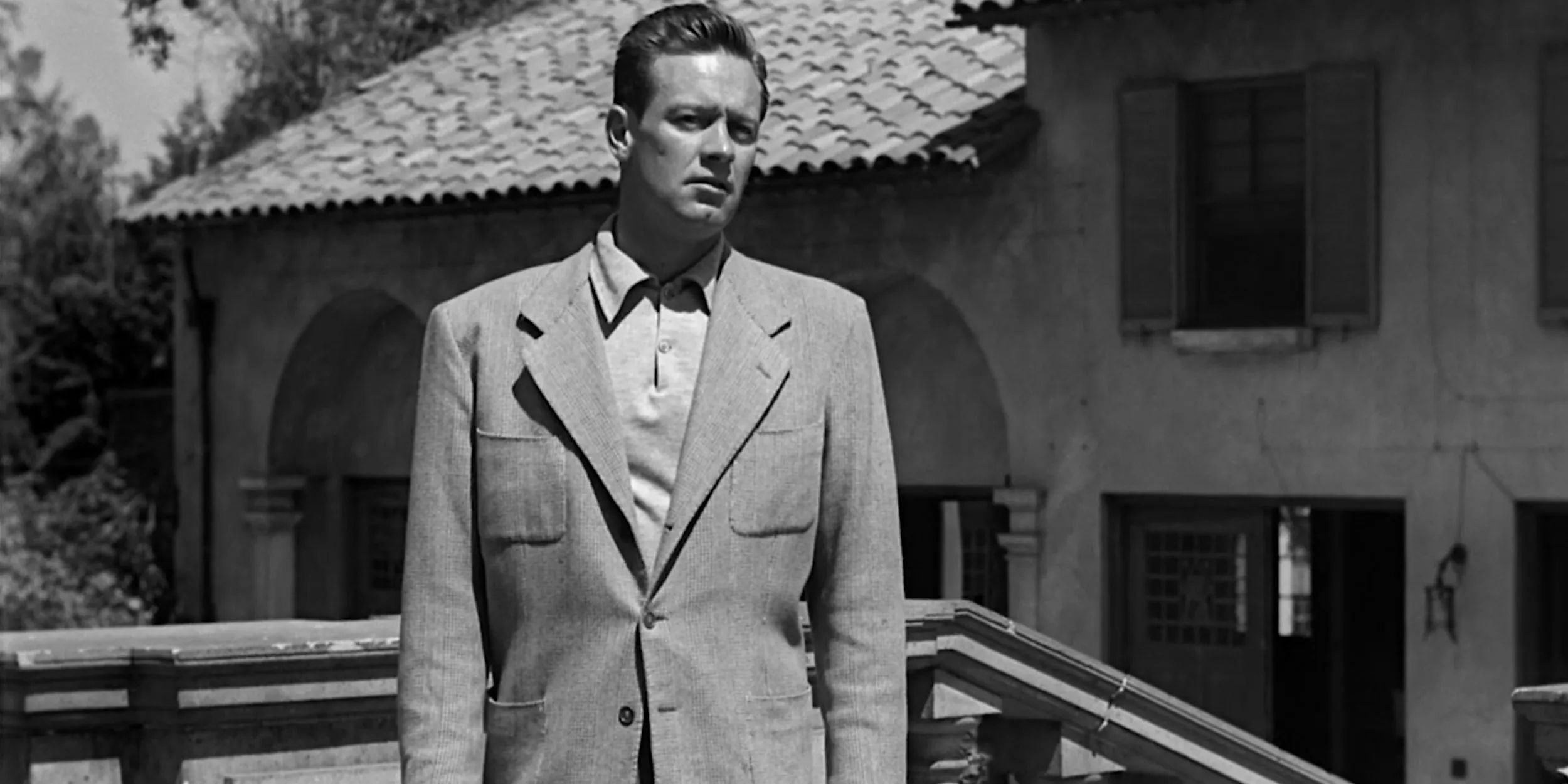
Indeed, the ironic plot of the movie feels like a statement Wilder, Brackett, and Marshman want to make about Hollywood. Dreams come true there, and all the glamour is real. But it all comes at the price of a dreamer’s soul. Consider, for a moment, the countless celebrity meltdowns that have come and gone in the 75 years since Sunset Boulevard first hit screens. Even a lifetime later, the film’s observations about Hollywood, creativity and celebrity culture feel as fresh as ever.
Wilder seems to see Hollywood as a place where everybody takes advantage of everybody. Other than the four leads, even side characters get in on the scavenger game. Joe’s agent, who has taken a chunk of Joe’s livelihood, collects his paycheck without helping Joe to find work. Sheldrake, a studio executive, passes off his script-reading duties to Betty. Even DeMille, whom the movie presents as mostly above reproach, probably due to the power in Hollywood he wielded, can’t bring himself to tell Norma the truth about her script. He forces aids and other studio hands to handle the matter.
But then, Sunset Boulevard has no shortage of paradoxes. From its characters to its conflicting tones, to Wilder’s views of Hollywood itself, the film makes clear that the myths surrounding the movies and stardom are as true as they are false. That complexity has all the meditative qualities of a Zen proverb. No wonder all the characters here all seem a bit crazed. And, for all the restlessness of Franz Waxman’s jazz score, for all the magnificent black and white photography here, for all the irony, the characters — and their razor-sharp dialogue — make the film endure.

Related
Dune 2’s Black and White Sequence Was Given Pushback From Studio
Dune: Part Two’s cinematographer explains how Feyd-Rautha’s introduction sequence could have been entirely different with studio interference.
Sunset Boulevard’s Enduring Legacy
Bow in the Presence of Greatness
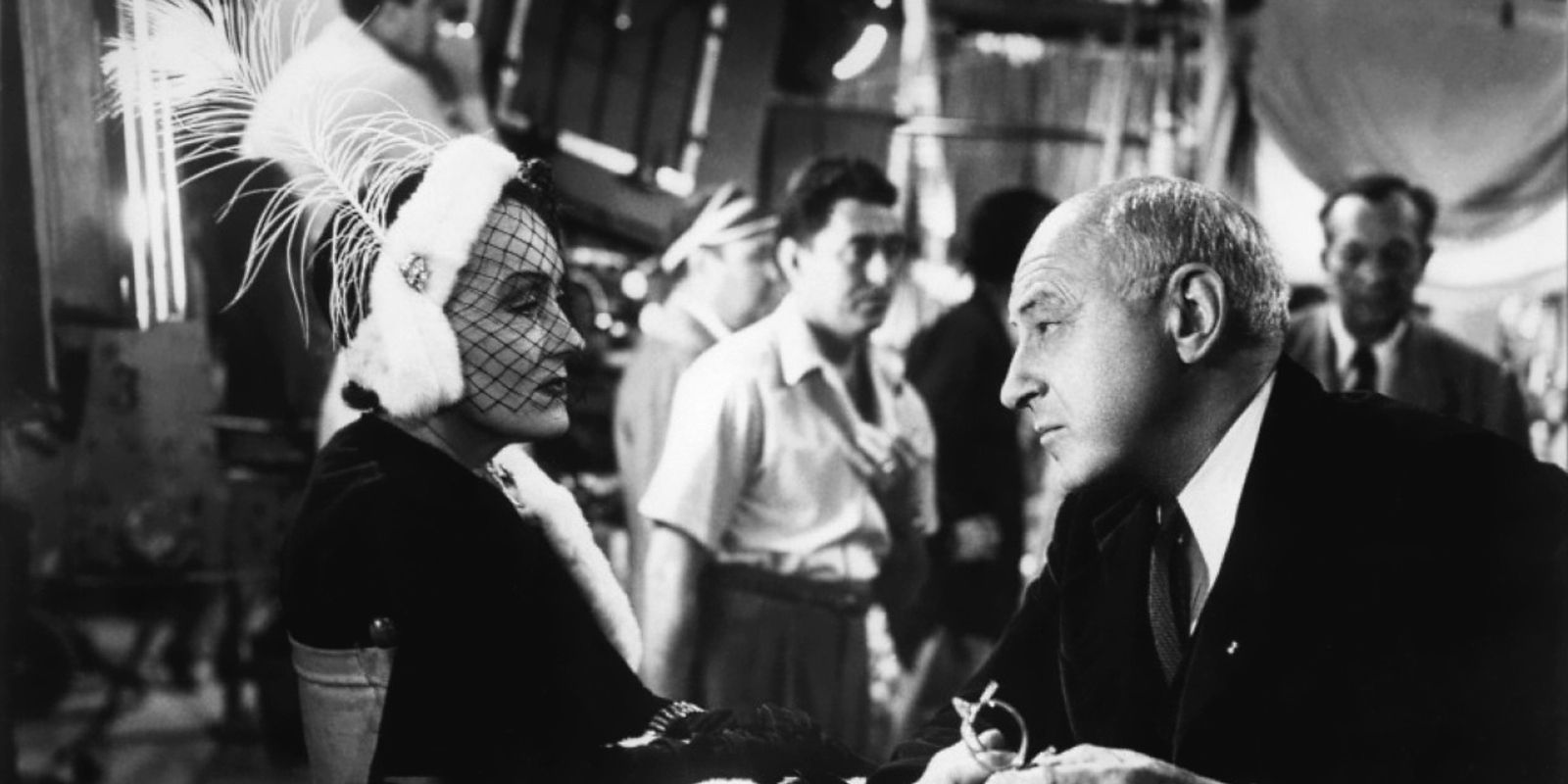
Various critics and cinephiles have tried to define Sunset Boulevard’s genre over the years. Film Noir? Satire? Greek Tragedy? Dark Comedy? Hagsploitation? Bits of the film could fall under any of these classifications, but no genre can quite hold Sunset. Billy Wilder made a complete work of art when he unveiled the movie, one that continues to have relevance and perception about the movies, stardom and the Hollywood myth. Wilder clearly loves Hollywood as much as he loathes it. Psychiatrists and philosophers could fill volumes trying to understand Wilder and the film, and yet, no amount of analysis could ever do it justice.
Movies do not get better than Sunset Boulevard. 75 years later, it stands tall alongside Citizen Kane, The Wizard of Oz, The Godfather, or any other film often named as the greatest. Filled with rich characters, unforgettable dialogue and a tonal balancing act for the ages, it will continue to mystify viewers for decades to come. Anyone who loves movies, or even just great stories, must see it to appreciate its brilliance. Billy Wilder may not have had any prescience in mind when he penned the film’s most famous line. But seven decades later, when Norma speaks it, the movie speaks of itself:
I am big. It’s the pictures that got small.
Compared to Sunset Boulevard, yes they did.
Sunset Boulevard is available to rent or own on streaming and physical media.
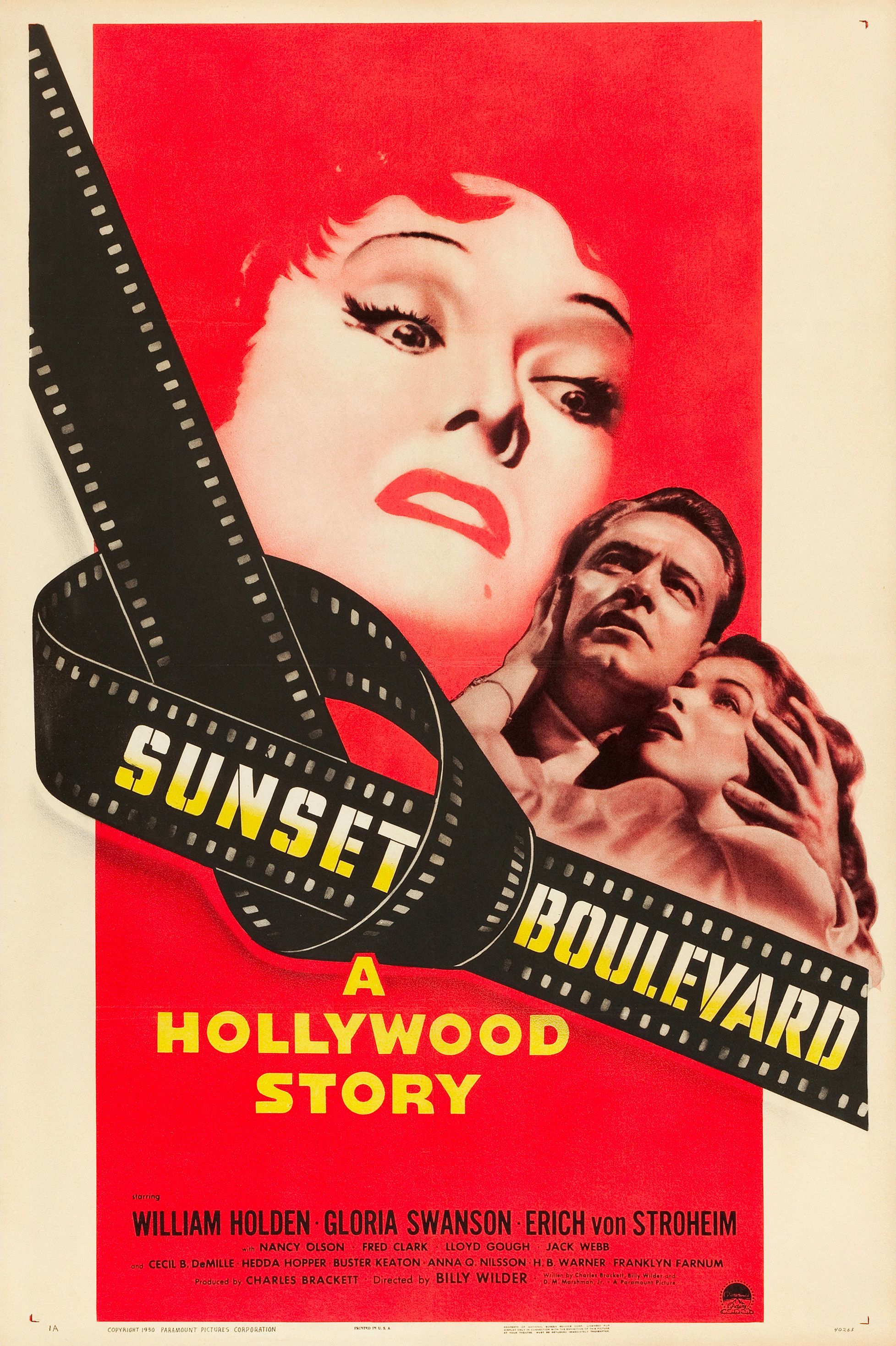
Sunset Boulevard
- Release Date
-
August 10, 1950
- Runtime
-
110 Minutes
- Director
-
Billy Wilder
-

William Holden
Joe Gillis
-

Gloria Swanson
Norma Desmond
- The most probing look at Hollywood ever.
- Characters of profound complexity, acted with some of the greatest performances ever.
- Unforgettable dialogue.
- Simultaneously very funny, and very sad.



